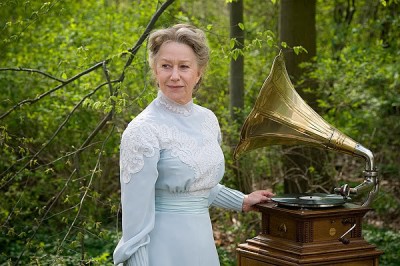| Reviews & Columns |
|
Reviews DVD TV on DVD Blu-ray 4K UHD International DVDs In Theaters Reviews by Studio Video Games Features Collector Series DVDs Easter Egg Database Interviews DVD Talk Radio Feature Articles Columns Anime Talk DVD Savant Horror DVDs The M.O.D. Squad Art House HD Talk Silent DVD
|
DVD Talk Forum |
|
|
| Resources |
|
DVD Price Search Customer Service #'s RCE Info Links |
|
Columns
|
|
|
Last Station, The

Covering the last several months of Leo Tolstoy's life, The Last Station reveals the struggle over Tolstoy's literary estate and poses interesting questions about the most legitimate heirs of one person's art. However, director Michael Hoffman's script (adapted from Jay Parini's novel of the same name) doesn't fully flesh out these issues, which are truly the heart of the story. Good dialogue and strong performances make up for a frustrating lack of narrative cohesion, but the film suffers in hindsight for its odd handling of Tolstoy as a character.
It is 1910, and Leo Tolstoy (Christopher Plummer), still a spirited force to be reckoned with, is spending the twilight of his life at his country estate, Vasnaya Polyana. Valentin Bulgakov (James McAvoy) is a recent arrival there, hired as Tolstoy's personal secretary by Vladimir Chertkov (Paul Giamatti) - the author's trusted protégée and chosen literary executor. Bulgakov finds Vasnaya Polyana a hotbed of familial/political intrigue, most of it generated by tension between Chertkov and the Countess Sophia Tolstaya (Helen Mirren). The countess is determined to retain the copyright to her husband's works for the ongoing benefit of her family. Chertkov, on the other hand, claims to be carrying out Tolstoy's wishes with regard to a renunciation of Tolstoy's copyright, placing the count's works forever in the hands of the Russian people. This concept goes hand-in-glove with Tolstoy's disapproval of private property and promotion of passive resistance against oppressive authority; as the chief of the "Tolstoian" movement, Chertkov's mission is to enact Tolstoy's espoused principles in a concrete way. The struggle between Chertkov and Countess Sophia challenge the very foundation of Tolstoy's relationship with his wife, just as young Bulgakov finds burgeoning love with a woman (Kerry Condon) who lives at a nearby Tolstoian commune.
The hub of this story is the question of who Tolstoy's works "belong" to. Are they the rightful inheritance of his long-suffering but loving wife and their eight children (and untold grandchildren)? Or is Tolstoy's literary corpus the spiritual inheritance of the Russian people, for whom he harbored a lifelong reciprocal devotion? This question boils down to one of Tolstoy's own intentions - what did he really believe and what did he really intend? Strangely, The Last Station avoids Tolstoy's own perspective. Instead the film focuses on the machinations of Chertkov and the countess Tolstaya, allowing their wishes to represent the opposing interests involved (i.e., familial legacy versus public cultural legacy).
Still, Tolstoy, portrayed energetically by Christopher Plummer, is allotted significant screen time in the film; he is a major character with a lot of dialogue who interacts with and makes a great impact on the other characters in the film. It is odd, then, that we are not provided with a clear explication of the man's own intentions and wishes. If Hoffman intended for Tolstoy to serve merely as a catalyst for the debate over the copyright of his works, then it would have been wiser for Tolstoy to have remained in the shadows, a mysterious, intentionally-veiled character. Instead, he is shown here in full-blooded conversation with all major and supporting characters, all of which scrupulously avoid direct mention how he envisions the disposition of his legacy. This results in a nagging disconnect among the action on the screen, the dynamics between the other characters, and Tolstoy's ultimate decision to give up his copyright.
These criticisms of the screenplay aside, all of the performances are excellent. McAvoy brings a wide-eyed combination of devotion and confusion to his portrayal of Bulgakov; his maturation over the course of the film, both as a skeptical observer and as a romantic lead, is measured and entirely credible. Plummer, despite the vague position the screenplay put him in, evinces a robust charm as Tolstoy. Giamatti is appropriately uptight and snide as the sycophantic Chertkov. Standing out from these other fine actors is Helen Mirren as Sophia; she valiantly out-performs the script as the anxious, loving, frustrated countess, filled to the brim with a competing mixture of desperate concern for her family's future and an unshakeable love for her husband. It's a powerhouse of a performance that Hoffman nonetheless curtails now and then through choppy editorial choices.
The DVD
Image
The enhanced 2.35:1 transfer looks strong, but a little overly bright, especially during the daytime exteriors. The blacks are solid. There is minimal but noticeable video noise. The brightness is the main issue here, as it can make things look washed out in a way that I doubt was intentional. A decent transfer, slightly marred.
Sound
The Dolby Digital 5.1 surround track is able but hardly a knockout, which is to be expected for an historical drama that is mostly dialogue-driven. Everything is clear and evenly-balanced. Ambience is minimal, but the music by Sergei Yevtushenko is lovely and comes across well.
Bonus Content
Several good bonus features shed light on the production. There are two commentary tracks, the first of which features leads Christopher Plummer and Helen Mirren. Just having these two legends on the same track (and recorded together in discussion) is a noteworthy event, and these two not only enjoy each other's company immensely, but are very funny, and have much of interest to contribute. This track may be more entertaining than the film itself, and is well worth listening to - even though there are significant gaps of silence. The second track features writer-director Michael Hoffman; it is more technical and production-oriented than the first. The Missed Station (7:49) is a pretty amusing gag reel. A group of Deleted Scenes (12:49) follow, most of which come from the film's final act. A Tribute to Christopher Plummer (18:43) comes from a 2009 AFI celebration of the actor's career; here Plummer participates in a discussion before a live audience. The feature's Theatrical Trailer wraps things up.
Final Thoughts
The Last Station has a lot going for it: an outstanding cast and committed performances; an unusual subject; good photography and appealing production values. But it sorely lacks a major component of the central story: Tolstoy's point of view. This strange vacancy suppresses the film's emotional impact. The film is well worth seeing for the performances, and the DVD's commentary track with Mirren and Plummer is a must-listen. Recommended.
|
| Popular Reviews |
| Sponsored Links |
|
|
| Sponsored Links |
|
|
| Release List | Reviews | Shop | Newsletter | Forum | DVD Giveaways | Blu-Ray | Advertise |
|
Copyright 2024 DVDTalk.com All Rights Reserved. Legal Info, Privacy Policy, Terms of Use,
Manage Preferences,
Your Privacy Choices | |||||||













